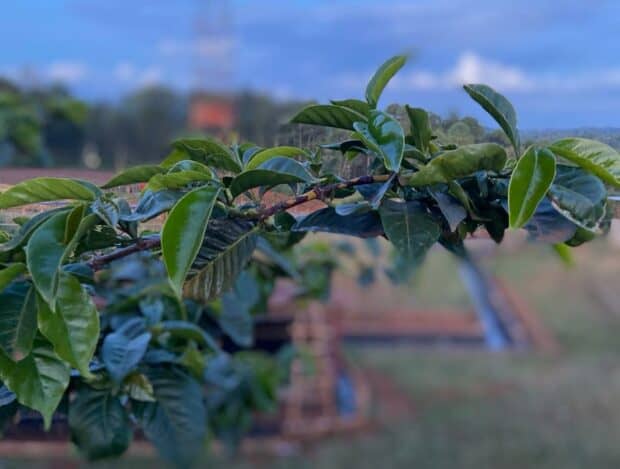Ashley King-Bischof founded a company called Sprout in 2021 with a multifaceted approach to building climate resilience for smallholder coffee farmers.
The firm offers seasonal climate insurance to farmers while using advanced technology to provide information and advice on weather-related issues so farmers can better mitigate climate risks independently.
A 2023 USAID Development Innovation Ventures (DIV) grant recipient, Sprout is piloting its insurance service plus an array of digital products with 1,000 farmers in Kenya, with the goal of improving climate resilience and incomes.
King-Bischof has been working at the intersection of microfinance and technology since 2008, focusing on the support of smallholder farmers. She spent seven months in Bamenda, Cameroon as a Kiva fellow in 2019, helping a microfinance institution manage loan repayments while integrating an online lending platform.
It was in Cameroon that King-Bischof met Martha, a coffee farmer who made a lasting impression on her and continues to inspire her support of women in the agricultural sector.
“Martha was so badass,” King-Bischof told DCN. “She had her own business, and she was managing it. She was strong and fun to be around.”
When she returned to San Francisco, King-Bischof spent three years working with Yelp, learning how to scale startup and web-based technology companies, yet her passion for microfinance kept calling.
Said King-Bischof, “The whole time I was at Yelp, I was telling everyone, ‘Hey, there’s this thing called microfinance, and it’s really important.”
It wasn’t long before King-Bischof returned to Africa, this time to Kenya where she worked with onion traders. After about two years, she switched her focus to the coffee sector, where the global nature of the agricultural product could allow a startup firm like hers to leverage more international interest.
Coffee also proved to be a natural fit for the business’ focus on climate resiliency. “Climate is potentially destroying double-digit percentages of coffee,” King-Bischof said. “Meanwhile, we’re trying to grow more to meet the current demand for coffee.”
In Sprout’s area of focus in Kenya, unpredictable rains are impacting nearly every aspect of coffee production, from the number of flowers on the trees to farmers picking cherries prematurely because of anticipated downpours.
“Farmers have been telling me for years that the rains are inconsistent, that they’re not behaving as they used to,” said King-Bischof. “In order to bridge today’s climate challenges with a climate-resilient future for farmers, they need tools. They’re demanding tools, but that’s going to cost money, and they don’t have extra money.”
To help the farmers know how to make the necessary changes to their work, Sprout is working with NASA Harvest, a project that utilizes satellite observations and AI to benefit agriculture. Sprout and NASA Harvest have co-developed an original digital coffee map in Kenya that is designed to result in more concise localized climate data.
Sprout also created a “weather index crop insurance” service for smallholder farmers. With traditional crop insurance, the claims process is expensive and requires proof of loss, which means that farmers have to wait too long to receive reimbursement. With weather index crop insurance, automatic payments are made to the farmer once a certain threshold is met.
Sprout weather alerts were piloted with two cooperatives in 2021 and 2022, and the insurance component launched last September. There are currently 10,000 farmers in the program, but because the insurance is dependent on donor and member support, only 1,000 are currently insured. There is a waitlist of farmers interested in the weather index crop insurance.
In 2019, when Sprout was just an idea on a whiteboard at the Global Innovation Lab for Climate Finance, King-Bischof saw grant funding as a means to launch a high-impact business benefitting smallholder farmers. Moving forward, the San Francisco-based firm hopes to build more private-sector engagement, specifically with roasters and other value chain actors in the coffee industry.
“We’ve been able to secure government and foundation money to build something that’s really great for farmers. We’re going to refine it and get better at it,” King-Bischof said. “In six months from now, I hope I’m on monthly Zoom calls with coffee roasters, sharing the progress of the program and what their support and contributions mean for farmers.”
Comments? Questions? News to share? Contact DCN’s editors here.
Jen Roberts Jen Roberts is a Paris, France-based writer and avid coffee drinker. She’s currently writing a book on women in coffee.


